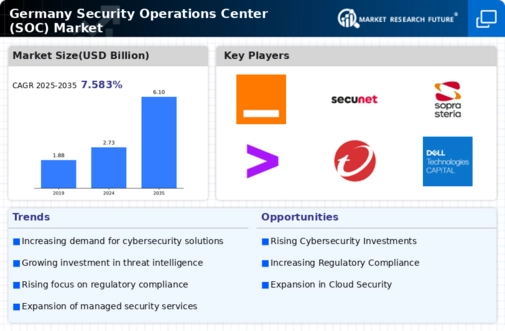Growing Cyber Threat Landscape
The increasing complexity and frequency of cyber threats is a primary driver for the Germany security operations center market. As organizations face sophisticated attacks, including ransomware and phishing, the demand for robust security operations centers (SOCs) intensifies. In 2025, the German Federal Office for Information Security reported a 30% rise in cyber incidents compared to the previous year. This alarming trend compels businesses to invest in advanced SOC capabilities to protect sensitive data and maintain operational integrity. The need for real-time threat detection and response mechanisms is paramount, leading to a surge in SOC deployments across various sectors, including finance, healthcare, and manufacturing. Consequently, the Germany security operations center market is poised for substantial growth as organizations prioritize cybersecurity measures to mitigate risks.
Regulatory Compliance Requirements
Regulatory compliance is a significant driver influencing the Germany security operations center market. The implementation of stringent data protection laws, such as the General Data Protection Regulation (GDPR), mandates organizations to adopt comprehensive security measures. Non-compliance can result in hefty fines and reputational damage, prompting businesses to establish or enhance their SOCs. In 2025, approximately 70% of German companies reported that compliance with GDPR was a key factor in their cybersecurity strategy. This regulatory landscape necessitates the integration of advanced monitoring and incident response capabilities within SOCs to ensure adherence to legal requirements. As organizations strive to meet these obligations, the demand for specialized SOC services and solutions is expected to rise, further driving the growth of the Germany security operations center market.
Increased Awareness of Cybersecurity Risks
The heightened awareness of cybersecurity risks among organizations and consumers is a crucial driver for the Germany security operations center market. As high-profile data breaches and cyberattacks dominate headlines, stakeholders are increasingly recognizing the importance of cybersecurity. In 2025, surveys indicated that over 80% of German businesses considered cybersecurity a top priority. This shift in perception is leading to increased investments in SOC capabilities, as organizations seek to bolster their defenses against potential threats. Furthermore, the growing emphasis on cybersecurity training and awareness programs is fostering a culture of security within organizations, which in turn drives the demand for effective SOC solutions. As awareness continues to grow, the Germany security operations center market is likely to experience sustained growth, with organizations prioritizing the establishment of robust SOCs to safeguard their assets.
Technological Advancements in Security Solutions
Technological advancements play a pivotal role in shaping the Germany security operations center market. The integration of artificial intelligence (AI), machine learning, and automation into security solutions enhances the efficiency and effectiveness of SOCs. In 2025, it is estimated that over 60% of German SOCs have adopted AI-driven tools for threat detection and response. These technologies enable SOCs to analyze vast amounts of data in real-time, identifying anomalies and potential threats with greater accuracy. As organizations seek to leverage these innovations, the demand for advanced SOC services is expected to rise. Additionally, the emergence of cloud-based SOC solutions offers scalability and flexibility, further driving market growth. Consequently, the Germany security operations center market is likely to benefit from ongoing technological advancements that enhance security operations and improve overall cybersecurity posture.
Collaboration and Information Sharing Initiatives
Collaboration and information sharing among organizations and government entities are vital drivers for the Germany security operations center market. Initiatives such as the Cyber Security Council of Germany promote cooperation between public and private sectors to enhance national cybersecurity resilience. In 2025, collaborative efforts have led to the establishment of several information-sharing platforms, enabling organizations to share threat intelligence and best practices. This collective approach fosters a proactive security posture, as organizations can better anticipate and respond to emerging threats. The increased collaboration not only strengthens individual SOC capabilities but also contributes to the overall security landscape in Germany. As organizations recognize the value of shared intelligence, the demand for SOC services that facilitate collaboration is expected to grow, further propelling the Germany security operations center market.























